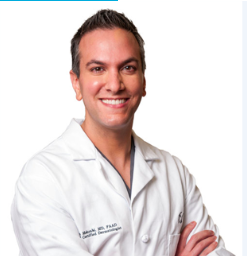
Dr. Don Mehrabi, MD
Physician
Dermatology
Specialty
Cosmetic Dermatology,
Dermatologic Surgery,
Mohs Surgery
Medical Expertise of Dr. Don Mehrabi, MD
Dr. Mehrabi has a particular interest in Botox, dermal fillers, Mohs surgery, and laser dermatology.
Dr. Mehrabi enjoys all aspects of dermatology, including medical/general dermatology, pediatric dermatology, cosmetic dermatology, surgical dermatology, and laser dermatology.
Dr. Mehrabi enjoys all aspects of dermatology, including medical/general dermatology, pediatric dermatology, cosmetic dermatology, surgical dermatology, and laser dermatology.
About Dr. Don Mehrabi, MD
Dr. Don Mehrabi, MD, is a board-certified dermatologist providing medical care to patients in the Beverly Hills, California area at BH Skin Dermatology.
Dr. Mehrabi has frequently been named a Top Doctor by organizations such as Castle Connolly, the International Association of Healthcare Professionals, Los Angeles Magazine and has been named as one of Glendale's Best Dermatologists since 2010.
In 2016, Dr. Mehrabi was awarded as one of America's Most Honored Professionals-Top 1%- by American Registry.
Procedures & Services
Patient Education Resources
How can a dermatologist make me appear more youthful?
A dermatologist can make you appear more youthful by using a variety of treatments, such as:Topical creams and serums that contain ingredients like retinoids and hyaluronic acid to improve skin textur...
A dermatologist can make you appear more youthful by using a variety of treatments, such as:Topical creams and serums that contain ingredients like retinoids and hyaluronic acid to improve skin textur...
If I have psoriasis, am I likely to get arthritis?
Psoriasis is a chronic skin condition that causes red, scaly patches on the skin. It affects about 2-3% of the population. People with psoriasis are at an increased risk of developing a form of arthri...
Psoriasis is a chronic skin condition that causes red, scaly patches on the skin. It affects about 2-3% of the population. People with psoriasis are at an increased risk of developing a form of arthri...
What is the best brand of botulinum toxin to improve my appearance?
Botulinum toxin is a type of neurotoxin that is used for a variety of cosmetic and medical purposes. There are several different types of botulinum toxin available on the market, each with their own u...
Botulinum toxin is a type of neurotoxin that is used for a variety of cosmetic and medical purposes. There are several different types of botulinum toxin available on the market, each with their own u...
What is the treatment for rosacea affecting my eyes?
Ocular rosacea is a subtype of rosacea that affects the eyes, and it can cause symptoms such as redness, itching, burning, and a gritty sensation in the eyes. Treatment for ocular rosacea typically in...
Ocular rosacea is a subtype of rosacea that affects the eyes, and it can cause symptoms such as redness, itching, burning, and a gritty sensation in the eyes. Treatment for ocular rosacea typically in...
What medications are used to treat acne?
There are several medications that can be used to treat acne, including:Topical retinoids (e.g. tretinoin, adapalene)Topical antibiotics (e.g. clindamycin, erythromycin)Topical benzoyl peroxideOral an...
There are several medications that can be used to treat acne, including:Topical retinoids (e.g. tretinoin, adapalene)Topical antibiotics (e.g. clindamycin, erythromycin)Topical benzoyl peroxideOral an...
Education & Training
After graduating from Kent State University, Dr. Don Mehrabi completed his medical degree at Northeastern Ohio University's College of Medicine.
Dr. Mehrabi performed his preliminary internal medicine internship at Emory University/Grady Memorial Hospital in Atlanta, Georgia.
Dr. Mehrabi then completed his three-year dermatology training at the University of Texas Southwestern Medical Center.
Dr. Mehrabi performed his preliminary internal medicine internship at Emory University/Grady Memorial Hospital in Atlanta, Georgia.
Dr. Mehrabi then completed his three-year dermatology training at the University of Texas Southwestern Medical Center.